- Classic American
- Texas Grilled BBQ
- Mexican tomato chicken
- French Chicken
- Italian red meat flavor
- Ziran steak (sorry, I don't know what/where Ziran is)
- Cucumber
- Braised pork ribs
- Korean kimchi
- Beijing duck (a.k.a. Peking duck)
Wednesday, October 25, 2006
Chinese Chips
Tuesday, October 24, 2006
More Expectations and observations
Men: In this patriarchal society little courtesy is shown to women. Men and women seem to fall into the same general categories of work as in the US. In Brad's office all the HR staff is women and 95% of the programmers are men. All the teachers in Andrew's day care women. However, there is no such thing as "ladies first". I've never had a problem getting a seat on a bus when Andrew was with me, but it is always a woman who gives her seat up for the lady with the baby. On the other hand, husbands and boyfriends don't seem to have a problem carrying their beloved's purse for them - even if it high fashion pink.
Bugs: I was expecting to see some nasty bugs here, and we definitely have some mosquitoes, but mostly the bug level is the same as in Colorado. I'm relieved that there are no cockroaches lurking in my less than spotless kitchen. However, I'm sure the bugs are kept in check by a less visible threat from insecticides.
Saturday, October 21, 2006
Funny signs & shirts
From a bell tower overlooking Beijing:
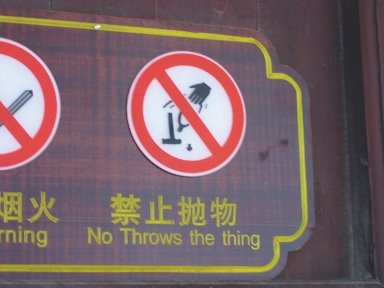
No throws the thingThis one is from a jacket for sale at the Hangzhou train station:
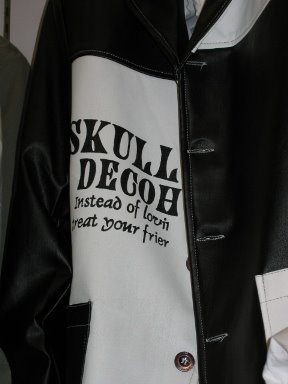
Yeah, my photo kinda stinks, so here's the transcript.
Skull Dekoh: Instead of Lovin treat your frierThe thing that I find most amusing about that one is that someone managed to string together 6 seemingly random English words (ignoring the first 2) and create a phrase that is grammatically correct, yet nonsensical. Reminds me of Madlibs.
I spotted a woman right outside our office building at lunch one day wearing a T-shirt with text below (front and back, respectively). Unfortunately, I didn't have my camera.
de puta
Pablo Escobar, el magico
Ten bucks says she doesn't even realize it's Spanish, much less have any idea what it means.
And today, while hiking along a mountain ridge above Hangzhou, I saw a Chinese boy about 3 years old with a confederate flag on the front. Superimposed on the flag are the words:
It's a white thing. You wouldn't understand
I'm devastated that my camera batteries were dead today. I would've loved to get that photo!
Friday, October 20, 2006
My Greatest Hits

For all my fans, this is the album you've been waiting for. Brad Swanson's Greatest Hits - all on one 33-RPM LP! Vinyl, baby - vinyl.
Wednesday, October 18, 2006
Fireworks at 6:15 a.m.
Pajamas in public
If you're in a high-rent district, wearing pajamas sends one more message: not only can I afford pajamas, but I can afford to live here.
Saturday, October 14, 2006
The Great Wall without the crowd
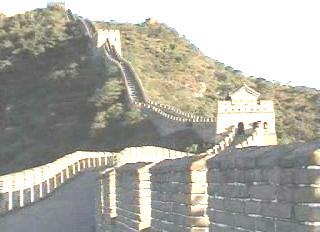
This section has been restored, just like Ju yong guan, but it feels older and more authentic. The scenery here is more spectacular, too, with steeper, rugged mountains.
I reached the highest point of the restored section, and the only thing between me and miles of ancient, unrestored wall is a flimsy sign reading "closed to tourists". Without so much as a chain across the stone doorway, this is practically an invitation for adventure and one which I definitely cannot resist. Besides, the Chinese ignore every other rule and sign anyway (no smoking signs, traffic signs, etc.) so why pay any attention to this one?
For the next few hours, I explored this rustic section of the wall by myself. Shrubs and trees are slowly reclaiming the walkway, and watch towers are partially collapsed. The wall stands about 10-15 feet tall, 10 feet wide, and it's constructed from huge stones and very well-made bricks. The large watch towers are only a few hundred yards apart - surprisingly close together considering the extra effort required to build them. The amount of manual labor required to construct such a massive structure in this steep, remote location is unimaginable.
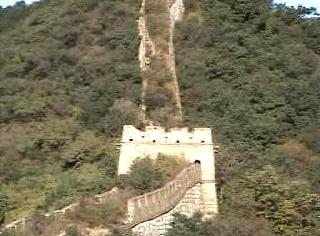
Watch a 10-minute video of my adventure below.
Great Wall: Ju yong guan
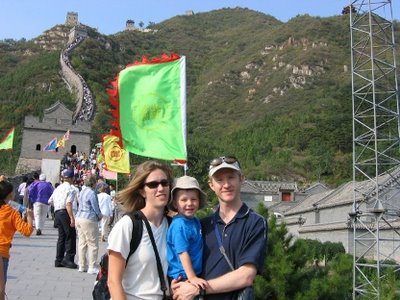
Fortunately, after a short way, about half the crowd gives up on the arduous hike, with some steps as much as 18 inches tall, and heads back down. Andrew had it easy, riding the whole way in an Ergo baby carrier on my back. Despite the crowds, we enjoyed hiking on a bit of (restored) history and the view from 1000 feet above our starting point.
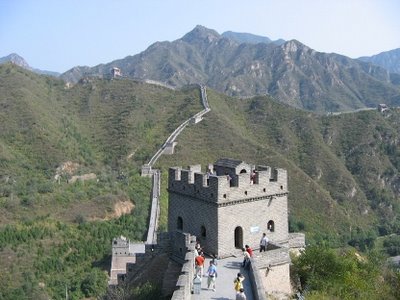
The China Daily
- Free newspaper launched in Guangzhou [a city near Hong Hong]
- Thai Princess unveils country's first royal blog
- Joe Blow named new CFO of Progressive Insurance Co. [in the US]
Here's another good story: the Chinese government has launched a campaign to improve the manners of Chinese people travelling abroad.
Uncivilized behavior is becoming a real embarassment for China. Spitting and littering top the list of behavior among Chinese travelers.Travelers are also being admonished not to talk too loudly and to respect queuing rules. Can't they launch this campaign in the homeland first? Please!
In the interest of fair and balanced journalism, there are a few things we Americans could stand to improve, too.
- Look around - is anyone else in your host country wearing short-shorts, obnoxious T-shirts, plunging neck lines, or exposing their belly buttons to the world? No? Well then you shouldn't be, either. When in Rome...
- I don't care how many people speak a little English so they can more effectively overcharge you for crappy souvenirs. Learn how to say at least "hello" and "thank you" in the local language
Tuesday, October 10, 2006
Old Mao good, new Mao bad
Back in Hangzhou, large fireworks displays were a daily occurrence near the holiday - as late at 10:30 pm and as early as 6:30 am!!! -- but I've learned that these are for wedding celebrations and have nothing to do with the holiday.
We did notice a number of people wearing red armbands, reminiscent of the Red Guards from the openly-despised Cultural Revolution of 1966-1976 which brutally supressed expression, culture, and religion. Most of the people wearing them were middle-age or older. Many of them were sweeping trash from the street and in the forbidden city, and a few of them were sitting and talking in front of their homes or small shops. I asked my co-workers about these folks, and was told the modern-day Red Guard are volunteers who agree to keep the city clean and safe. They're also somehow associated with the communist party, but my friends weren't able to quite explain how -- due to their limited English, not a reluctance to discuss it, as far as I can tell. I've openly discussed a few other politically sensitive topics with the Chinese, and they don't seem to shy away from it.
We hired a pedi-cab (rickshaw) driver to take us through Beijing's famous hutong, a complex web of narrow alleyways and crowded courtyard houses which at one time comprised most of the city. He spoke very limited English, but was able to clearly communicate his disdain for the cultural revolution. Interestingly, he had mixed feelings for Mao himself, the ultimate architect of the cultural revolution and the 1958-1960 Great Leap Forward, a soviet-style economic experiment which was at least partly to blame for the starvation deaths of an estimated 30-60 million Chinese. The pedicab driver's quote:
Old Mao good, new Mao bad.
Sunday, October 08, 2006
Living in an authoritarian state
Google on the term police state, and the first link is the wikipedia entry. Somebody wanna let me know what it says? I can't read it because the wikipedia site (which is a fantasic, free on-line encyclopedia) is blocked in China. No doubt the entry on Tiananmen Square isn't too flattering to the People's Republic.
Expectations
Rules: I had expected that a country with an authoritarian government would be populated with people who are used to following rules and regulations. It seems that as long as you stay out of politics there is very little you can't do. Go ahead and smoke in front of the no smoking sign, only Andrew will ask you why you are smoking when the sign clearly says not to. Ride your bike over the bridge with the huge sign with the slash through the picture of a bike. And it is most definitely not a problem to pass a police car on the shoulder of the road while going double the speed limit.
English: I expected more people to speak more English. There is usually someone around to help translate when it is necessary and if there is really a problem we can use the cell phone to call one of Brad's co-workers to translate, but your average waiter or salesperson does not speak English. When we were traveling before finding someone who spoke English was never a problem. I think this largely has to do with being on the tourist circuit. We did not have this problem in Beijing, but we were in an area heavily traveled by foreign tourists.Clothes: Apart from costumed waiters at theme restraints and on tourist boats the only people I have seen wear "traditional" clothes are monks. People wear western style clothes and I have no problem finding any style I want from sweatpants to couture. What is different is the way people match their clothes. People's shirts are often very loud and flashy and women's shirts frequently have beads or sparkles. It's no problem to wear that orange shirt and purple pants together. In SE Asia it was more common to see people in traditional or at least partly traditional clothes.
Shoes: My comments on shoes are largely the same as clothes but bear special mention in that most Chinese women are slaves to fashion. There are tablets at the Great Wall with a quote from Mao stating, "You are not a man until you have climbed the great wall". What if you do it in high heels? You're probably not a man, but it's a feat I witnessed none the less.
Buildings: While the palaces and temples of Beijing are colorful they don't hold a candle to the flashy temples of Thailand. Though there is more splashes of color and intricate designs in the architecture surrounding Beijing the buildings elsewhere are more reminiscent of East Germany, utilitarian rectangles. Very functional, but not very pretty. Most of the newer buildings (which in Hangzhou is many) have more style with curves and key holes and other modern flair, but there is very little of what I would consider "Chinese" architecture.
Shopping: I was prepared to buy our daily goods at an open air market. There is no need, I simply walk a block to the local chain grocery store to get my everyday goods. If I want something exotic, like cereal or low fat milk, I just take the bus downtown to Carrefore (a French chain similar to Super-Walmart).
I'm surprised by how much my life is the same. Andrew goes to school and I work. In the evenings he plays with the neighbor kids before or after dinner. Brad goes to work every day. I go shopping for food and clothes. The biggest change is that we don't get to see our extended family regularly. Also, I feel really uninformed. We listed to radio streamed on the internet over breakfast and every now and then I checkout MSNBC online, but I don't get nearly as much US or international news and I can't understand the local news.
Saturday, October 07, 2006
Beijing's Forbidden City

The grandiose site names are guaranteed to instill awe, and perhaps a few chuckles too:
- The gate of character cultivation
- The gate of divine military genius
- Hall of preserving harmony
- Hall of supreme harmony
- Palace of earthly tranquility
- Palace of abstinence
All the buildings in the forbidden city are capped with yellow roof tiles; this color tile is reserved only for the royal palaces and sacred temples.
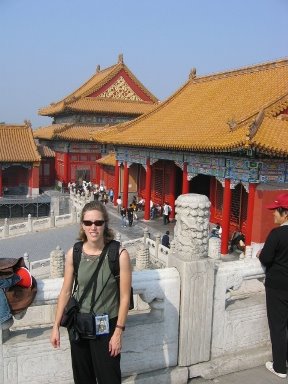
This photo shows a sample of the fancy artwork adorning the temple structures.
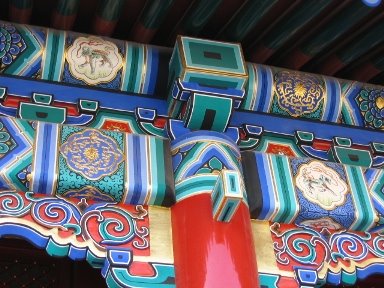
Friday, October 06, 2006
Night train to Beijing
Andrew had fun playing with a 9-year-old girl who shared our compartment. Andrew and Betty (her English name) had lots of fun running up and down the corridor. Andrew sang while she played Twinkle Twinkle Little Star on her flute. In the morning, after saying goodbye and walking thru the train station, we came across a distraught Betty who was in tears because she had to leave Andrew. He's breaking hearts already.
We're staying at the Crowne Plaza in Beijing, a 5-star hotel and one of the nicest hotels I've ever stayed in, for only $65 a night. Gotta love it.
The cafeteria
In an unexpected capitalist twist, they have 2 companies serving grub competing for your business. At least there's some incentive to make the food decent.
This is one case where the setup in Bangalore (where I spent 3 weeks with my last job) was far superior. There, the company hired a catering company to fix a tasty lunch every day just for the 30 or so people in our office.
Dining in China
Chopsticks are a fun novelty for the occasional visit to a Chinese restaurant back home, but let's be honest -- unless you're eating sushi, forks are the way to go. Have you ever eaten a serving of soy beans, one at a time, with chopsticks? Or how about soft, slippery tofu? The Chinese have a short cut for these situations - hold the plate to your mouth and shovel it in with your kuaizi (Mandarin for chopsticks). Loud slurping sounds are perfectly acceptable, especially for long noodles, by the way.
You had also better get used to bones. Fish, poultry, frog, pork, beef -- it's all served with plenty of bones. Whole bone-in chicken is commonly chopped into half-inch cross-sections, so dodging jagged bits of bone is a necessity with every bite. (Anyone remeber the Simpons episode where each of box of Krusty O's cereal features a bonus of jagged metal Krusty O's?) Many types of fish are so packed with annoying little bones that's it's just not worth the effort to eat - especially with chopsticks. In another case of western ettiquete clashing with eastern, the Chinese seem to favor the technique of spitting out the bony bits after chewing.


